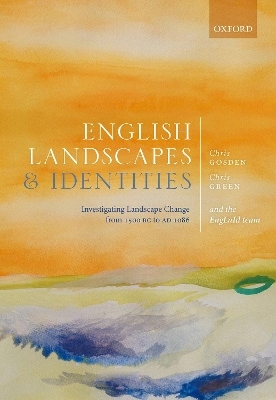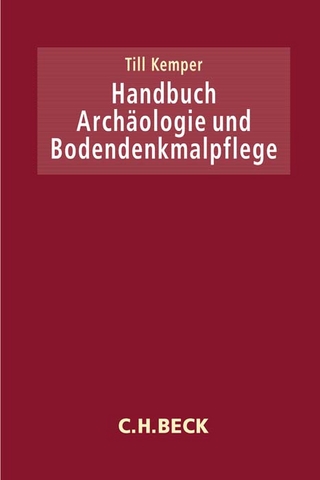
English Landscapes and Identities
Oxford University Press (Verlag)
978-0-19-887062-3 (ISBN)
Long before the Norman Conquest of 1066, England saw periods of profound change that transformed the landscape and the identities of those who occupied it. The Bronze and Iron Ages saw the introduction of now-familiar animals and plants, such as sheep, horses, wheat, and oats, as well as new forms of production and exchange and the first laying out of substantial fields and trackways, which continued into the earliest Romano-British landscapes. The Anglo-Saxon period saw the creation of new villages based around church and manor, with ridge and furrow cultivation strips still preserved today.
The basis for this volume is The English Landscapes and Identities project, which synthesised all the major available sources of information on English archaeology to examine this crucial period of landscape history from the middle Bronze Age (c. 1500 BC) to the Domesday survey (c. 1086 AD). It looks at the nature of archaeological work undertaken across England to assess its strengths and weaknesses when writing long-term histories. Among many other topics it examines the interaction of ecology and human action in shaping the landscape; issues of movement across the landscape in various periods; changing forms of food over time; an understanding of spatial scale; and questions of enclosing and naming the landscape, culminating in a discussion of the links between landscape and identity. The result is the first comprehensive account of the English landscape over a crucial 2500-year period. It also offers a celebration of many centuries of archaeological work, especially the intensive large-scale investigations that have taken place since the 1960s and transformed our understanding of England's past.
Chris Gosden is Professor of European Archaeology in the School of Archaeology, University of Oxford Chris Green is Postdoctoral Researcher (GIS) in the School of Archaeology, University of Oxford Anwen Cooper is a prehistoric specialist from the Department of Classics, Ancient History and Archaeology, The University of Manchester Miranda Creswell is an independent Project Artist Victoria Donnelly is a Senior Cultural Heritage Consultant at Arup Tyler Franconi is Visiting Assistant Professor of Archaeology at the Joukowsky Institute for Archaeology & the Ancient World, Brown University Roger Glyde is Researcher on the EngLaId project, School of Archaeology, University of Oxford. Zena Kamash is Senior Lecturer in Roman Art & Archaeology in the Department of Classics, Royal Holloway, University of London Sarah Mallet is Post-doctoral Researcher at the Pitt Rivers Museum, University of Oxford Laura Morley is Research Administrator at the School of Archaeology, University of Oxford Daniel Stansbie, Oxford Archaeology Letty ten Harkel is EAMENA Postdoctoral Researcher at the School of Archaeology, University of Oxford
1: Chris Gosden, Tyler Franconi, and Letty ten Harkel: Introduction
Section 1. The Creation of Archaeological Data, the Making of Our Database and the Form of Our Analyses
2: Anwen Cooper, Victoria Donnelly, Chris Green, and Letty ten Harkel: Characterful Data: Its Character and Capacities
3: Letty ten Harkel, Anwen Cooper, Victoria Donnelly, Chris Gosden, Chris Green, Tyler Franconi, and Laura Morley: Patterns In The Data Across England
Section 2. The Exploration of Broader Patterns
4: Tyler Franconi and Chris Gosden: Long-Term Interactions Between Society and Ecology
5: Tyler Franconi and Chris Green: Movement
6: Sarah Mallet and Dan Stansbie: Substances and Cycles
7: Chris Green and Chris Gosden: Field Systems, Orientation and Cosmology
8: Letty ten Harkel and Chris Gosden: Identity, Naming, and Division
Section 3. Understanding Regional and Local Variability
9: Anwen Cooper, Chris Green, and Chris Gosden: Scale
10: Anwen Cooper, Chris Green, and Laura Morley: Time
11: Chris Gosden, Anwen Cooper, Miranda Creswell, Victoria Donnelly, Tyler Franconi, Chris Green, Roger Glyde, Letty ten Harkel, Zena Kamash, Sarah Mallet, Laura Morley, and Dan Stansbie: Landscapes and Identities: Conclusions and Reflections
| Erscheinungsdatum | 23.06.2021 |
|---|---|
| Verlagsort | Oxford |
| Sprache | englisch |
| Maße | 180 x 253 mm |
| Gewicht | 1094 g |
| Themenwelt | Geisteswissenschaften ► Archäologie |
| ISBN-10 | 0-19-887062-0 / 0198870620 |
| ISBN-13 | 978-0-19-887062-3 / 9780198870623 |
| Zustand | Neuware |
| Informationen gemäß Produktsicherheitsverordnung (GPSR) | |
| Haben Sie eine Frage zum Produkt? |
aus dem Bereich


